As dusk approaches, Hendiyanto Gunawan, the Managing Director of Dunia Baru or New World Coffee Supplier rushes to his office to monitor the world coffee prices in commodity markets on the other side of the world; exactly in New York City, where the NYMEX (New York Mercantile Exchange has just begun its activity. He must pay close attention to the changes of coffee prices, which will help him to decide on the prices he should sell to his customers – all through the computer screen in his office which is located at Bandengan area in Jakarta. A graduate of Nanyang Techonological University in Singapore majoring in Business Management, Hendi, with his three – out of seven – siblings run a family coffee business that has been around for three generations, which began in the 70s.
Image 2: Hendiyanto Gunawan,Managing Director Dunia Baru Coffee Supplier.
The question is not who buys his coffee but how much does he sell, as every day, 14 to 15 tonnes of coffee produced by Dunia Baru is sent to many places around the globe, including many places of its country of origin, Indonesia. That’s just one of many things Hendiyanto Gunawan and I discussed together, on one lovely afternoon over the weekend.
Dunia Baru still resides at the same location since Engkong (Bahasa for grandfather, usually used in Betawinese culture), as Hendi refers of him fondly, started the business with next to nothing, using ancient tools and equipment that are still being used even today. His office is far from luxurious, except for the two Saeco and ECM espresso machines that he uses to test coffee flavours. When I was there, one of his employees were skillfully using the machines, showing extraction results that are far from disappointing.
“My mother still comes to the office to help run the company, and it’s a good way to keep herself busy, since my father, Ng Tjan Tjhong passed away.” said Hendi. Each of his three siblings has different responsibilities too, but all of them play an important part in making the company the way it is now.
As I entered the factory which was possibly as big as a quarter of a soccer field, I was welcomed with the familiar fragrance of coffee beans that were being roasted. The industrious Brazilian-made Lilla coffee roasting machine has been used for 15 years and the smoke coming out of it has successfully decorated some parts of the building with soot. Some of the thirty employees working there were getting ready to collect and bag the roasted coffee beans into sacks, which would be sent the next day in seven trucks; carrying 2 tonnes of coffee each.
Image 4: Dunia Baru produces up to 15 tonnes of coffee a day.
The heat from the roasting machine didn’t discourage me from the tour around the factory with its owner. As I was looking around, sitting in the corner, I saw two coffee sorting equipments made of teak wood – both in mint condition, which had stood by with Dunia Baru since the day it began producing coffee. The raw coffee beans were placed in sacks after sacks, reaching up to 2 meters high, occupying the 1000 meter squared storage room. The coffee beans are delivered straight from the farmers and middlemen, going through a high quality control process the minute they arrive in location.
“I’m afraid it’s something we have to do, considering that some do get a bit naughty and send products with qualities that are nothin like the samples they give to us,” explained Hendi. According to Hendi, naughty suppliers do exist, so extra care must be given to ensure that the company avoids unecessary problem and God forbid, criminal penalties in court.
Image 5: Employing 30 people who has been working for decades.
Fighting for customers is expected, however Dunia baru remains consistent in giving the best quality products that come with prices that have been agreed upon. Competitors with ridiculously cheap prices usually don’t last long, especially when product consistency is the aspect of the whole business. As I listened and nodded at the same time, I couldn’t help thinking how hard it must be to complete in this “black gold” industry.
The employees at Dunia Baru have endured many working hours and most of them have been working for more than 30 years. “That one,” pointed Hendi to an older gentleman, “has been working here since I was a little boy.”
Image 6: Coffee merchant at Anyar traditional market in Bandung. According to Hendi, these merchants are not to be underestimated, because their turnover is quite large, even though they cater for smaller sales.
Dunia Baru still concentrates to the core of its business, which is providing coffee, but in the last couple of years they have started providing services and consultations on coffee blends to many major companies in Indonesia. Hendi is the forerunner who aims for a different business approach by penetrating the café market, although its demands are relatively small. Kopi Tiam (traditional and old-fashioned breakfast and coffee stalls or shops) business who uses a lot of robusta coffee is quite promising, because Indonesia remains as one of the best robusta coffee manufacturers in the world. Besides Kopi Tiam, coffee sales in traditional markets is something one should not underestimate, since the transaction scale is quite large. “The only down point is that the merchants can’t refuse selling coffee in small batches, even as small as an ounce.” Described Hendi.
Half jokingly, we agreed upon having small experiments to brew robusta coffee in one of those tall teapots that are traditionally used in Kopi Tiam stalls, even though we ended up buying the rest of the much-needed equipment. My short talk with Hendi over the weekend must end eventually, but still, we insisted on finding the la dolce vita in a cup – Kopi Tiam. A small farewell present from Hendi; a special blend that he brewed especially for a huge cuisine manufacturer in Indonesia, in which I had the honor to taste, straight from his espresso machine.
___________
Dunia Baru
Menjelang sore hari Hendiyanto Gunawan, Managing Director Dunia Baru Coffee Supplier bergegas menuju ke ruang kerjanya untuk memantau harga kopi dunia di pasar komoditas di kota New York (NY Mercantile Exchange =NYMEX) yang baru memulai aktivitasnya. Melalui layar komputer di ruang kantornya di daerah Bandengan Jakarta ia harus memperhatikan dengan seksama pergerakan harga kopi yang akan membantunya mengambil keputusan berapa harga yang harus ia jual ke para pelanggannya. Hendi yang lulusan Nanyang Technological University Singapore jurusan bisnis ini mengelola sebuah bisnis kopi keluarga yang sudah mencapai tiga generasi sejak tahun 70an bersama tiga dari tujuh orang saudara. Jangan ditanya siapa saja yang membeli kopi di sini, tapi setiap hari 14 hingga 15 ton kopi hasil racikan Dunia Baru dikirim ke berbagai wilayah Indonesia dan juga luar negeri. Perbincangan singkat saya di akhir pekan kemarin dengan Hendiyanto Gunawan.
Dunia Baru masih menempati lokasi yang sama setelah Engkong, begitu ia memanggil sang Kakek yang dengan gigih merintis usaha ini dari nol dengan sebagian peralatan yang masih bisa digunakan hingga sekarang. Ruangan kantornya juga sederhana, dengan dua mesin espresso merek Saeco dan ECM yang digunakan unuk melakukan test rasa kopi hasil racikan di sini. Seorang karyawan lapangannya sudah piawai menggunakan mesin espresso dan memperlihatkan hasil esktraksinya dengan hasil yang tidak mengecewakan.
“Ibu saya masih ke kantor untuk membantu operasional perusahaan sekalian mengisi waktu setelah ditinggal Bapak saya Ng Tjan Tjhong. Tiga orang saudara laki2nya masing2 punya peran yang berbeda, tapi kesemuanya telah menjadikan perusahaan keluarga ini menjadi besar seperti sekarang.
Memasuki ruangan pabrik yang mungkin luasnya seperempat lapangan sepak bola langsung disambut aroma kopi yang sedang di roasting. Mesin sangrai kopi industrial merek Lilla buatan Brazil telah bekerja selama 15 tahun dan kepulan asapnya telah menjadikan sebagian bangunan ini dhiasi jelaga berwarna hitam. Sebagian dari tiga puluh orang karyawannya tengah bersiap mengeluarkan dan memasukan kopi hasil roast ke dalam karung untuk dikirim keesokan harinya dengan armada tujuah truk yang masing2 bisa mengangkut dua ton kopi.
Udara panas dari mesin roasting tidak mengurungkan niat saya untuk terus mengelilingi lokasi pabrik dengan sang tuan rumah. Di sudut saya melihat peralatan sortir kopi dari kayu jati yang masin berfungsi dengan baik peninggalan saat Dunia Baru mulai beroperasi. Di area gudang yang jumlah persediaan kopi mentahnya berupa tumpukan karung setinggi dua meter lebih memenuhi ruangan seluas lebih dari 1000 meter persegi. Kopi didatangkan langsung dari petani dan juga para broker dengan kontrol kualitas yang ketat saat baru tiba di lokasi perusahaan.
“Maklum kalau tidak teliti mereka sering nakal mengirim kopi yang jauh berbeda dengan sampel yang diberikan”, ujarnya. Menurutnya, kejadian supplier kopi yang nakal bukanlah hal yang baru, jadi kalau tidak hati2 perusahaan bisa terkena masalah, bukan saja kerugian material tapi juga malah pidana.
Rebutan pelanggan adalah masalah biasa, tapi Dunia Baru tetap berusaha konsisten memberikan produk terbaik dengan harga yang sudah disepakati bersama. Pesaing yang membanting harga biasanya tidak bertahan lama, apalagi konsistensi produk merupakan hal yang akan menjadi tolok ukur ukur dalam bisnis ini. Saya cuma mengangguk sambil mencoba memahami kerasnya persaingan di bisnis black gold ini.
Karyawan di sini sudah mempunyai jam terbang tinggi dan banyak yang sudah punya masa kerja lebih dari 30 tahun. “Yang itu, kata Hendi menunjuk seorang bapak tua, sudah bekerja di sini sejak saya masih kecil”.
Dunia Baru masih berkonsentrasi pada core bisnis dibidang penyediaan kopi, tapi beberapa tahun terkahir ini mereka mulai menyediakan layanan dan konsultasi racikan kepada banyak perusahaan besar di Indonesia. Hendi merupakan ujung tombak yang mencoba sedikit merombak pendekatan bisnis dengan merambah pasar cafe walau menurutnya kapasitasnya masih kecil. Bisnis Kopi Tiam yang banyak menggunakan kopi robusta menurutnya cukup menjanjikan karena Indonesia menyediakan jenis kopi ini yang merupakan salah satu terbaik di dunia. Selain kopi tiam, penjualan kopi di pasar tradisional merupakan ujung tombak yang tidak boleh dianggap remeh karena skala transaksinya sangat besar. “Cuma kalau di pasar, penjual kopi tidak bisa menolak jumlah pembelian yang relatif kecil seperti satu ons.
Walau belum serius kami sudah berjanji untuk mengadakan eksperimen kecil2an menyeduh kopi robusta dengan teko berleher panjang khas kopi tiam walau alatnya harus dibeli dulu :D. Perbincangan singkat di akhir pekan dengan Hendi harus diakhiri tapi kami harus menemukan La dolce vita in a cup. kopi tiam. Sekedar buah tangan dari Hendi, special blend yang ia racik khusus untuk sebuah perusahaan makanan besar di Indonesia yang saya coba di mesin espresso.


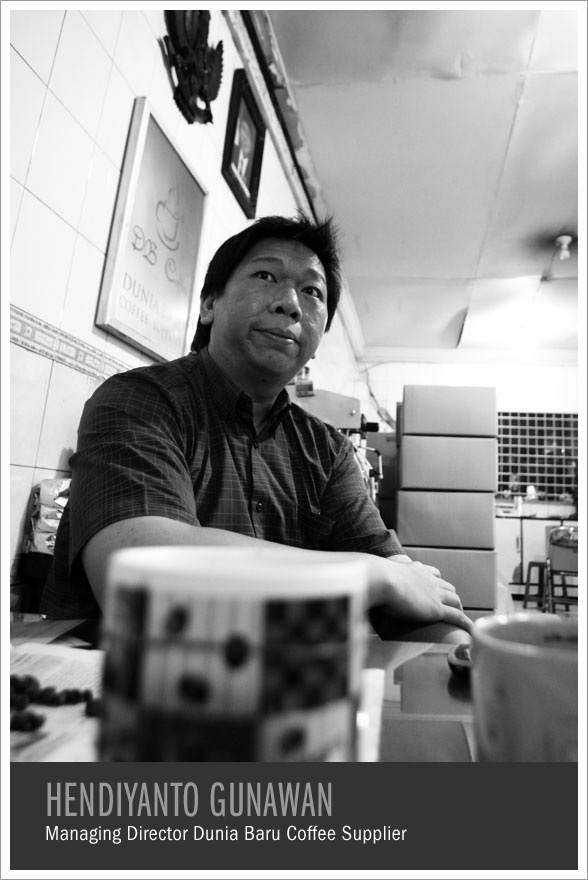
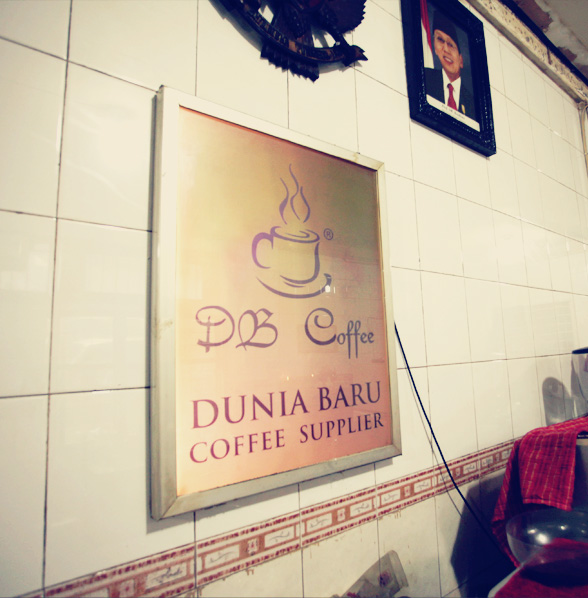
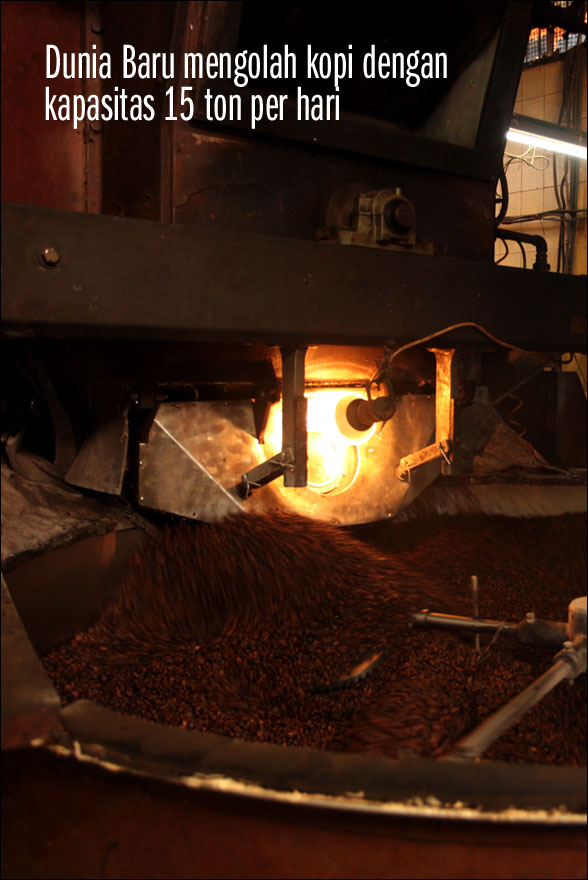

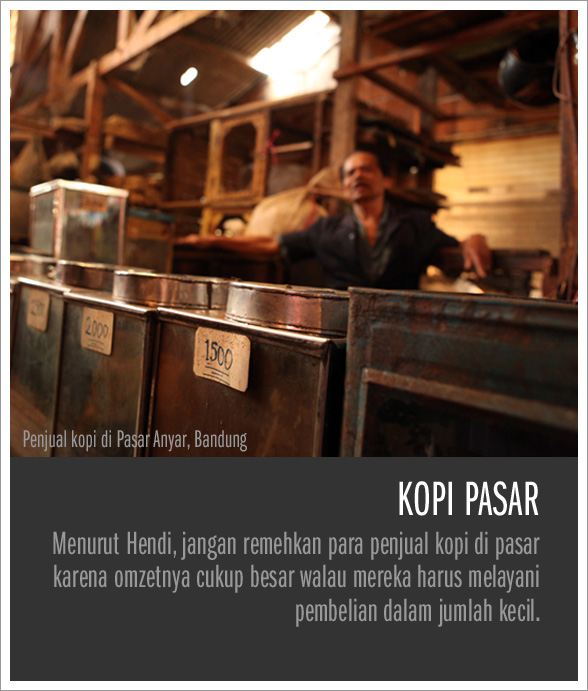
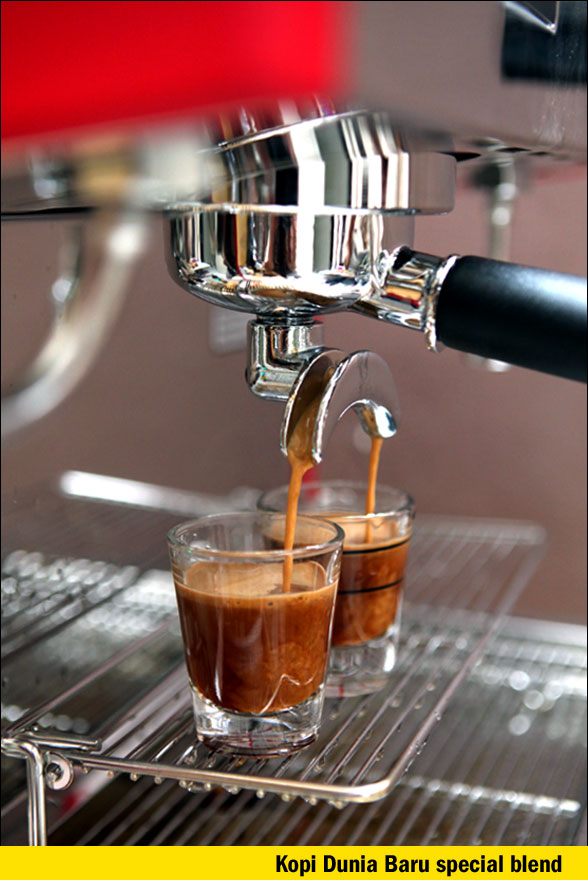
 Brewing coffee is truly a combination of art and science. It takes knowledge, skills, and most importantly, passion for a perfection. The contents of this coffeelicious blog is created by me, who effortlessly cool and adorable by nature. Trusting me at your own risks.
Brewing coffee is truly a combination of art and science. It takes knowledge, skills, and most importantly, passion for a perfection. The contents of this coffeelicious blog is created by me, who effortlessly cool and adorable by nature. Trusting me at your own risks.

salam kenal qertoev coffee gayo 08129997549
Kang, jadi DB fokusnya ke robusta ya?
Robusta apakah bagus untuk espresso??
wow..benar2 pengamat kopi sejati. salut utk ulasan2 tentang kopi nya Oom Toni, ternyata gak cuma jago motret aja.
banyak info ttg kopi yang saya dapet di sini. Selama ini saya cuma tau minum kopi saja.
tapi memaknai kopi jadi cerita sendiri buat saya..kopi itu benar2 lambang kebersamaan. dan representasi dari sebuah pertemuan.
thanks for sharing..
AYO NGOPI.
gw suka foto yang orang masukin bijih kopi. Itu bagus banget.
ini dimana ton kantornya?